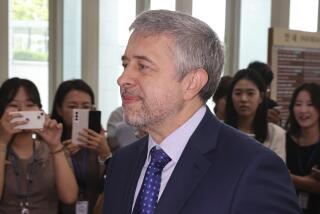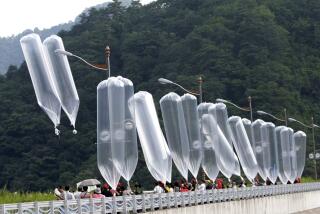PACIFIC PERSPECTIVE : Peninsular Rift Felt Acutely in Japan : Korea: The tide is turning against the North among Koreans living in Japan. There are hopes of sparking an economic crisis to topple Kim Il Sung.
TOKYO — The past year has seen pro-democracy movements gain momentum and topple Communist governments from East Germany to Mongolia. Even the two socialist giants, China and the Soviet Union, have not been immune from the wrath of their people. And now there are signs that this process may be getting under way in North Korea, the most brutal Communist society since the days of Stalin’s purges.
In the 45 years that North Korean dictator Kim Il Sung has ruled, he has gradually eliminated all rivals and cemented his grip on power, achieving the kind of personality cult that Stalin and Mao could only dream of. There are signs that Kim is further tightening the screws.
Part of the legacy of Japan’s militarist past is the community of 650,000 ethnic Koreans whose forefathers were forcibly brought to Japan to work as slave labor. Like their ancestral homeland, this community is divided between north and south. This division is also a product of the Cold War.
Soviet troops occupied the northern half of the Korean Peninsula at the end of World War II and established the Democratic People’s Republic of Korea. China’s intervention in the Korean War increased Chinese influence at the expense of the Soviets. Since then, the North has been able to maintain its independence from both the Chinese and the Soviets by playing one off against the other.
Kim’s ability to maintain this independence enhanced his reputation as national leader. The competition it generated between the Soviets and the Chinese for North Korean support also assured North Korea of maximum economic and military aid. Thus, North Korea was able to make large strides in economic development in the late ‘50s and ‘60s.
Meanwhile, South Korea was unable to come up with an independent national leader of its own. The American puppet Syngman Rhee was referred to as a “fascist” by his U.S. advisers.
Park Chung Hee, who took over South Korea in the early ‘60s, was a product of Japanese military institutions. While Kim was fighting the Japanese, Park was graduating at the top of his class from the Tokyo Military Academy, quite remarkable considering the repression and discrimination that Koreans faced at the time.
It is no wonder that Kim came to be viewed as the only independent national leader by most Koreans living in Japan. As a result, about 100,000 of them emigrated to North Korea between 1959 and 1984.
Meanwhile, the situation in Korea was changing. In south Korea, the change has been dramatic. Chun Doo Hwan gradually extended human rights and social welfare, a process that has been accelerated by his successor, Roh Tae Woo. While Chun was never very popular and Roh’s election victory was due to the fragmentation of the opposition, there is no doubt that the standard of living and the level of justice in the South has risen considerably. Koreans in Japan were able to see this for themselves during the Seoul Olympics.
At the same time, illusions about life in North Korea were being smashed. From letters sent to Korean residents in Japan by their relatives in North Korea, it became obvious that the North was an impoverished police state. Because of discrimination in the Japanese school system, many children of Korean residents attended schools run by the North Korean Residents Assn., which is loyal to the Pyongyang government. These students could see the disparity between much of what they were being taught and the reality of a totalitarian North Korea.
Furthermore, since the start of pro-democracy movements in other countries, North Korean residents in Japan are slowly starting to speak out. Numerous articles have appeared in leading Japanese news magazines telling the plight of Korean residents who returned to North Korea. These returnees were welcome not only because of the hard currency they brought with them, but also because they could be used to pry open the wallets of their affluent relatives in Japan.
However, because the returnees have experienced a much better life outside of the North Korean “Paradise on Earth,” they are considered a potentially subversive element and isolated and purged accordingly. These returnees have become hostages in every sense of the word. They are also held responsible for the action of their relatives in Japan, which is why Korean residents here have been so reluctant to speak out.
Koreans in Japan now appear ready for action. A rally against Kim Il Sung was held in downtown Tokyo in late May. The organizers were all former prominent officials of the North Korean Residents Assn. Among their aims is to get the organization, as well as individuals, to cease sending money to North Korea, and thus deprive the regime of its best source of hard currency. This, it is hoped, would create the kind of financial crisis that would make unification with the South the only way out, or lead to a Romania-like mass uprising by the country’s 20 million people. Then the world would be shocked to find out what has been going on for the past 45 years behind this most opaque section of the bamboo curtain.
More to Read
Sign up for Essential California
The most important California stories and recommendations in your inbox every morning.
You may occasionally receive promotional content from the Los Angeles Times.










